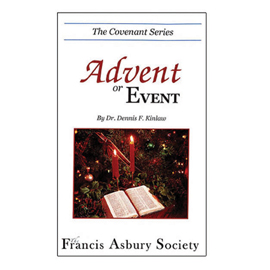
by Dennis Kinlaw, PhD
The Church calls this season Advent, and we celebrate it because of the birth of a baby called Jesus. How important was that birth? Well, it was important enough that our world has decided to mark all births by reference to this one. Our calendars on our walls and in our pockets are all determined by His appearance. One day I noticed, to my surprise, how personal this is. I actually count my age by his coming. My birthday is June 26, 1922, and the 1922 means my entry into this world was 1922 years after His. As I thought of that, I suddenly realized the date of every significant event in my life bears witness, by its date, to his entry into our world. My birth certificate, my driver’s license, my college, seminary and university diplomas, my marriage license and every check I have ever written or will ever write has the record of his birth on it. And when I die, the two main entries on my tombstone, other than my name, will be references to his birth. It is as if he is the key, not just to every event, but to time itself.
Historians of our world tell their stories in terms of this birth. The baby’s birth is not dated by the emperor on the Roman throne, but rather the emperor’s reign is dated by this baby’s birth. Even the New York Times pays tribute to his birth in the second line on the first page of every issue they ever print where it lists the date. Even the most powerful man in the world can be elected by the American people, but he cannot assume his office without placing his right hand on the book that tells the story of Bethlehem’s baby to hallow his oath. Not even he can escape the reference. The apostle Paul felt that way, for in his letter to the Galatians (4:4-7) he refers to it as the point to which all time prior to his coming pointed. The world of which you and I are a part has concurred in this by marking the years B.C and A.D. B.C. meant simply before the birth and A.D. after the birth. The letters A.D. particularly tell the story, for if comes from the Lating anno domini which means simply, “the year of our Lord.” Our world decided this baby was the Lord of time because he was the one who gave time to us. So every human story has to be told in reference to Bethlehem’s baby. We may ignore him but do not seem to be able to escape Him. .
Now what is it that makes this birth so significant? There are many things about it that call for attention. Where else does one get the story of a human birth from a mortal woman who has never known a human male sexually? This baby has no human father. What about this birth caused the King to feel threatened enough to murder all the babies under two years of age in the area? Where can one find the story of a human life that brought such blessing to so many individuals as the life that started here? But the most important truth here is not how he was born or what he did. The factor that determines everything here is who it was who was being born.
Two stories brought this home to me. I was a young pastor in the Methodist Church. Our denomination was beginning its membership decline. A conference for young pastors was planned to encourage evangelism in the church, and I attended as a delegate. The major speaker, Edwin Lewis, was a prominent theologian who had been at work on a Bible commentary. His time with the biblical text had left its impact on his life and his theology. He informed us that evangelism was simply sharing the Good News. He expressed concern that many of us did not have any good news to share. I will never forget how he thundered, “I can divide you all with one question. How you answer will tell me whether you have any good news to share or not. That question is ‘Was Jesus the son of Mary who became the Son of God or was he the Son of God who became the Son of Mary?” Suddenly, my intellectual world began to shift. I realized that I had tended to see in Jesus the best that this world could produce. Now I was being faced, with a very different point of view. Jesus was a part of this world but his origin was in another world. He was part of the very life of God himself. He was different than we. My origin was in my conception, and I never lived before I was conceived. The life that was in Jesus did not begin with his conception in Mary’s womb. He lived before in the Triune life of the eternal God. He was God come to man, the Creator entering His creation.
My second story comes from the life of the famous Scottish theologian, Thomas Torrance. During the Second World War, he served for a while as a chaplain in the British army. His unit was in a battle, and Torrance found himself ministering to a nineteen year old British soldier who had been badly wounded. Torrance knew the boy was dying, and the boy sensed it as well. He looked up at Torrance, and in panic asked, “Padre, is God like Jesus?” Torrance answered, “Son, you do not need to fear that there is any God lurking behind the back of Jesus. When you see Jesus, you have seen all there is to see of God.” This phrase, “behind the back of Jesus” occurs repeatedly in Torrance’s writings. This experience left an impact on him. When a person meets Jesus, they have met God.
These stories have helped me understand why those who have given us the Christian calendar insist on calling it Advent. There are some who would prefer to call Christmas The Christ Event. After all, the word event expresses the more common understanding of historical happenings. But the birth of Christ was was much more than merely an event in human history. The difference in meaning between advent and event helps explain that “more.” Both words, advent and event, are based on the same Latin root, venire, which means “to come.” The difference in the meanings of the two words is determined by the prepositions which were added to the verbal root “ven.” The “e” in event is the preposition meaning “from” or “out of.” The “ad” in advent means “to.” Both words speak of “coming,” but when used to refer to Jesus’ birth the term “advent” is preferable if we are thinking of source and end. A historical event is a happening that arises out of natural historical forces and can be explained by them. So “the Christ event” could explain the surprising impact of Jesus in human history as the best of all products that the creation has yet produced. Thus, he would be the model, the example, of what we should become. The implications of “advent” are quite different. It speaks to us of Christ’s coming to us – his willingness to come to his world and to bear the flesh and blood of His creatures.
If the implications that we are suggesting go with the term, advent, it is not difficult to understand Lewis’ identification of advent and Good News. If advent means that God has come to earth in Jesus Christ it means that heaven is not indifferent to human earthly life. Apparently, God cares surprisingly about us and wants to share our lot by actually becoming one of us. He knows in Himself what it means to be God. Now, in Jesus, He comes to know what it means to be human. God is not willing to keep a distance between Himself and His creatures. His desire is nearness and intimacy, analogical to the personal intimacy that He, the Son, knows with the Father and the Spirit in the Holy Trinity. He comes because He wants to share Himself with us so that we who are creatures can receive into our creaturely lives the One who is holiness, love, and eternal life. Paul expressed it with the words “Christ in you, the hope of glory.” I think Lewis was right. This is good news, the Good News.
______
*This article originally appeared in the November/December 2012 issue of The High Calling. It is also available as a tract in our Bookstore here.

Wow. I must have missed this when it was originally posted in the High Calling. This is really good stuff. Thanks Dr. K. for sharing these important thoughts. Have a blessed Christmas. I love you. Tom Atkins